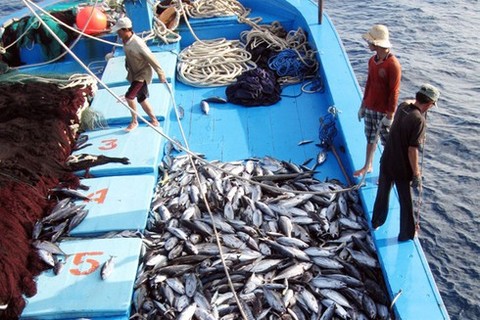
The European Commission’s (EC) inspection delegation has acknowledged recent improvements made by Viet Nam in the fight against illegal, unreported and unregulated fishing (IUU).— Photo infonet.vn
The European Commission’s (EC) inspection delegation has acknowledged recent improvements made by Viet Nam in the fight against illegal, unreported and unregulated fishing (IUU).
Tran Dinh Luan, deputy director general of Directorate of Fisheries (DoF), told a press conference on Thursday about the results of the inspection team from the EC Directorate General for Maritime Affairs and Fisheries which took place last month.
In a letter sent to the Vietnamese Directorate of Fisheries last Thursday, the EC’s inspection team recognised Viet Nam’s co-operation, transparency and honesty in providing and exchanging information during their time in Viet Nam.
They confirmed Viet Nam has made a lot of progress compared to the first inspection in May 2018 and is on the right track towards implementing the Fisheries Law and legal guiding documents.
The country’s significant improvements in the monitoring, control and surveillance of fishing vessels have been noted, which could be seen through their on-site inspection at Tac Cau fishing port, the busiest fish market in Kien Giang Province. In addition, the management process and organisation of fishing vessels and output through the port were carried out flexibly and effectively.
Viet Nam has also made great efforts to install fishing vessel monitoring systems, provide regulations and implement gear marking fishing vessels based on the EC’s recommendations.
The EC’s inspection team also acknowledged Viet Nam’s efforts in increasing management of fishing density through freezing offshore fishing fleets. The Ministry of Agriculture and Rural Development also issued a decision on assigning a quota of offshore fishing permits for 28 coastal provinces.
However, some shortcomings were pointed out, such as slow progress of installing cruise monitoring equipment on fishing vessels, incomprehensive surveillance systems with many technical errors, as well as limited and inconsistent sanctioning on violations among localities.
There is also no evidence to prove competent authorities ensure sufficient and accurate traceability mechanisms in fishery processing plants, they said.
The EC also said that they will not withdraw the yellow card if Viet Nam has not solved the problem of fishing in international waters.
Deputy Minister of Agriculture and Rural Development Phung Duc Tien said the EC assessed Viet Nam's efforts not only for removing the yellow card but also for future fishery resources and sustainable fishing.
The EC’s inspection team will return to Viet Nam to check on progress in the next six months. The country must submit a comprehensive report on the results of the recommendation implementation by May 15 next year.
The team has suggested Viet Nam continue completing its legal framework and law enforcement’s implementing work, along with increasing monitoring, control and surveillance of fishing vessels, seafood traceability and fishing certification.
According to Nguyen Thi Trang Nhung, deputy director of the DoF’s Department of Science, Technology and International Cooperation, the inspection team praised Viet Nam’s improvements in building a database of fishing vessels, updating information on fishing vessel licensing and planning for sustainable fishing vessel development.
Previously, Viet Nam had no surveillance system at the port but now it has been implemented as a model in Kien Giang that has effectively controlled fishing vessels.
In the near future, the fisheries sector and localities will handle strictly offshore fishing vessels, especially those fishing illegally, to create a real deterrent for violators and ships on the EC’s watchlist will face special monitoring. — VNS